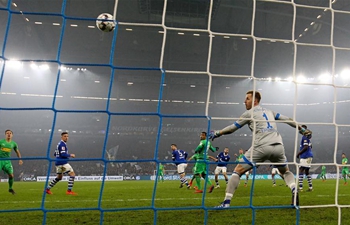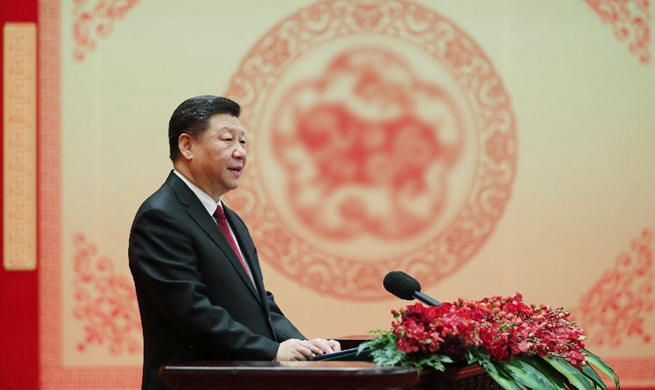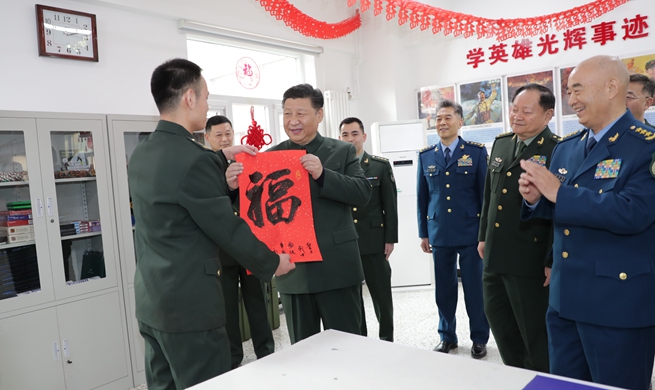by Keren Setton
Jerusalem, Feb. 3 (Xinhua) -- As the Palestinian cabinet resigned last week, there was no marked reaction in Israel. The Palestinian internal political move was met with Israeli indifference.
Attempts by Palestinian President Mahmoud Abbas to incorporate Hamas officials in the government sparked an immediate Israeli outcry.
Hamas and Israel are bitter enemies, with the former pledging to destruct the Jewish state.
The government that resigned was formed in 2013 and headed by Rami Hamdallah, who acted as prime minister.
There was to be a power-sharing agreement with Hamas that would allow for the Palestinian Authority (PA) to assume some of its authority in the Gaza Strip.
Hamas has ruled Gaza since it violently took over the territory in 2007. Since then, a sharp rift between Hamas and Abbas' Fatah party has torn the Palestinians with Abbas ruling the West Bank and Hamas in Gaza.
The new government is not expected to have any Hamas members in it. Reports in the media have speculated that this was a move to further pressure Hamas to hand over some authority in the Gaza Strip to the Fatah and the PA.
For Israelis, the make-up of the Palestinian government is less consequential.
"What matters to Israel is not who will be the next prime minister of the Palestinians, but who will be the next president," said Nimrod Goren, head of the Israeli Institute for Regional Foreign Policies.
Abbas has been at the helm since 2005. Elections have not been held since then. At the age of 83, some health concerns have led Israel and the Palestinian territories to wonder who will be his successor.
Years of stalemate in the Israeli-Palestinian peace talks under the Palestinian leadership of Abbas and Israeli Prime Minister Benjamin Netanyahu might only change if the two are replaced.
"The position of the Palestinians on the issue of the conflict with Israel is led by Abbas and his position reflects the...mainstream position and it will probably not be changed by any government," Goren added.
"Currently, there is serious distrust between the two sides, also on the personal level between Abbas and Netanyahu," said Ido Zelkovitz, head of the Middle East Studies program at Yezreel Valley College.
Israel should be interested in Palestinian internal politics. Past experience has shown that these processes have a direct impact on Israel's security.
The current Israeli government has led two separate policies with one towards Hamas in Gaza and the other towards the PA in the West Bank.
Gaza has been under a strict blockade imposed by Israel since 2007, rendering its economy one of the weakest in the world.
Hamas and Israel have fought three major wars since 2007.
"The current Israeli policy is 'divide and rule', separating between the two territories," Zelkovitz told Xinhua. "But the economic pressure that Gaza is faced leads to violent outbursts every so often."
New legislative council's elections in the PA have been slated for years, which were continually postponed by Abbas.
If the elections were held without Hamas participation, this might corner the militant organization to carry out attacks against Israel and cause instability in the West Bank.
"The Israeli interest is for stability within the Palestinian political system," Zelkovitz said. "Israel has no ability to intervene in this process and if it will, this will cause damage."
Israel itself is heading towards general elections in April.
"The Palestinian political developments should be of concern to Israel, but they are not," Zelkovitz said. "Israel is busy with elections and less aware of the importance of the changes in the West Bank."
While the moves in the Palestinian political system can be seen as largely internal, their impact on Israel is large.
The coming months in which changes are expected on both sides will be critical to the impact on how the conflict is managed.



















